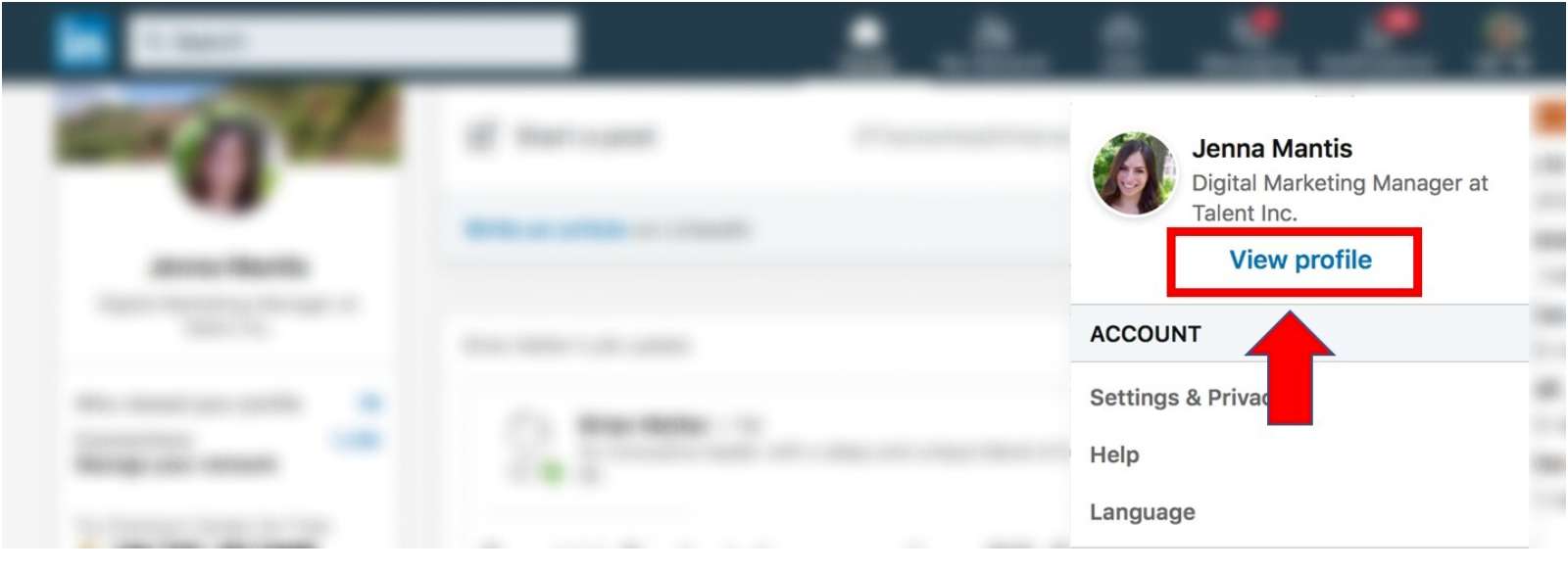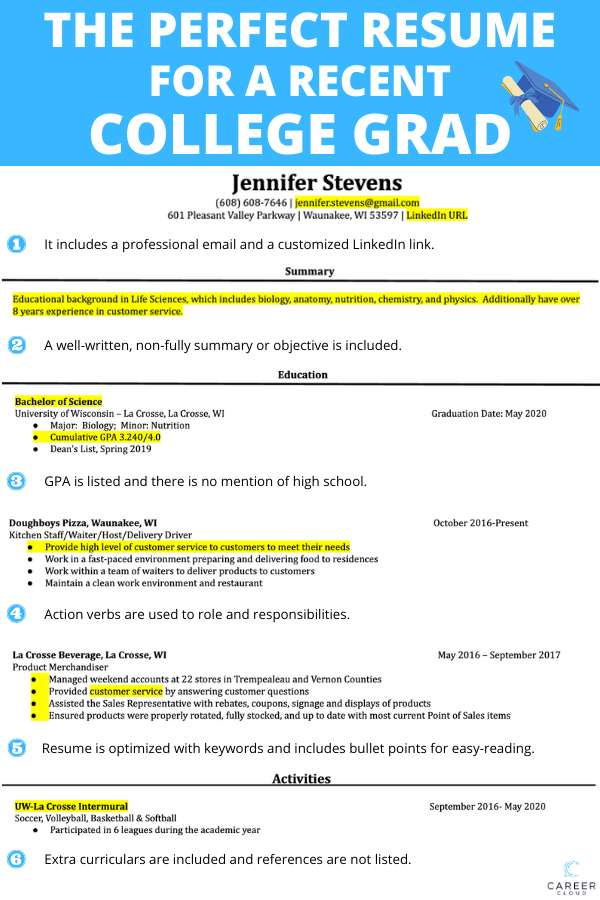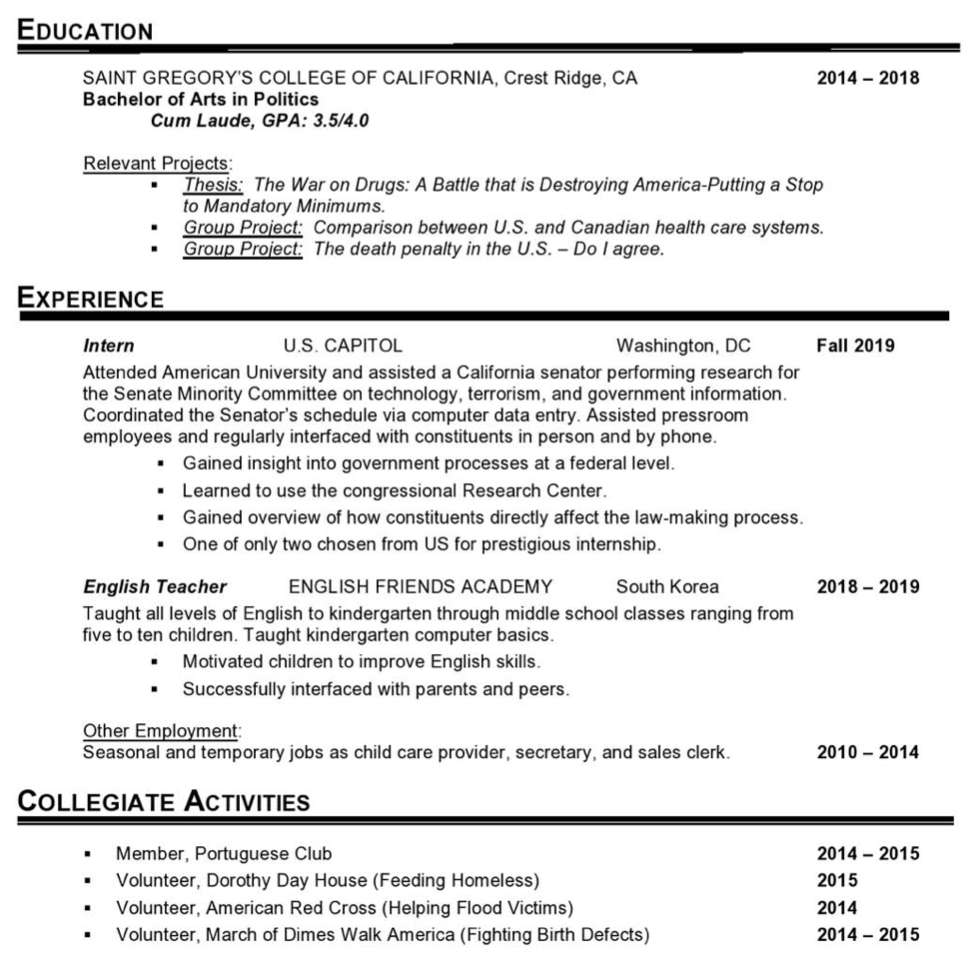Written By: Michael Gardon | Edited By: Mike Jelinek
You’ve been working your entire life so you can add a college degree to your resume. Now, you’ve achieved your goal and are part of the 37% of Americans who can list a four-year degree under the “Education” section of their CV.
But how do you make your resume stand out from the competition? As a college grad, you have the educational credentials–but you may lack the experience that other candidates have. To get job interviews and offers, you’ll need to show the hiring manager that you have the skills, abilities, and aptitudes needed to solve their organization’s problems.
Writing the perfect resume doesn’t have to be stressful. Our team recently reviewed the best resume-writing services. If resume writing isn’t your strength, let a pro handle it! Once your resume is ready to go, start your job search on ZipRecruiter! ZipRecruiter is free and you can apply for jobs with a single click!
7 Must-Have Elements For A Recent Graduate Resume
1. RELEVANT JOB SKILLS
Which skills are most essential to the job? The company will typically make this easy for you by including the required skills in the job description section of the listing. Look for hard skills, like software packages and programming languages, and soft skills, like communication and leadership. Highlight these in your resumes, cover letters, and job interviews to show that you’re qualified for the role.
2. TRANSFERABLE SKILLS
Don’t sell yourself short if you don’t have on-the-job experience with a given skill. Remember that the point is to show the employer what you can do, not just what you have done.
“One of my top tips for new grads is to highlight the transferable skills that you have earned at a job or experience, not just your responsibilities,” says Kelli Richards, an academic advisor and career counseling instructor at the University of Madison-Wisconsin, in an interview with CareerCloud. “Instead of saying, ‘responsible for serving food to customers,’ highlight the skills you earned by saying, ‘communicate with customers and provide excellent customer service by being attentive and responsive.’”
3. A WELL-WRITTEN, NON-FLUFFY SUMMARY OR OBJECTIVE
Most resumes begin with either an objective or a summary statement. These sections perform the same general function. They tell the hiring manager what you can do and give a brief sense of how you can do it.
The difference between an objective and a summary is perspective. While objectives reveal your goals, summaries show how you have achieved your previous employers’ goals. Objectives are short–a line or two at most. Most state the position the candidate is applying for and give a sense of their larger career goals. Summaries are several lines long, but still tightly focused on the essentials. If you have related experience, a summary can help you highlight that.
Summary statements are usually meant for people with multiple years of experience, but every little bit helps in the case of entry-level work. Even for a first job, positions usually say they require 1-2 years of experience in the job description. If possible, you should use quantifiable metrics. Think of these few sentences as your elevator pitch to the hiring manager; highlighting your strengths, accomplishments, and skills.
Example: Objective vs. Summary
Traditional objective statement: “To obtain a position in inside sales”
Summary statement: “Inside Sales Representative with 1 year of experience working with customer accounts, prospecting new business, and continually meeting sales quotas. Increased new signups by 40% and retained 90% of existing clients.”
4. RELEVANT KEYWORDS
Many companies use Applicant Tracking Systems (ATS) to sort candidates and make selections for interviews. To make sure that your resume makes the cut, study the job description and match your skills and experience to their requirements.
You can include keywords in the objective or summary statement, skills and experience sections, and in your cover letter. Use as many keywords as possible without looking like you're stuffing your resume full of them to get selected. Both the hiring managers and ATS will spot this quickly.
If you’re stuck, you can use synonyms for the keywords that you spot on in the job description. If you have room, you can add a core skills section that lists all of your skills that match the keywords. Place this section right after the summary or objective statement.
Always customize your keywords–and your resume as a whole. Don’t apply to two different positions with the same CV.
5. EXTRACURRICULARS AND HONORS
This is a great way to differentiate yourself from other candidates, as well as showing where your interests lie. Highlight any honors or accolades you received, and include any competitions you participated in, as well. Even if you didn’t place, it is still worth mentioning that you were involved.
6. A PROFESSIONAL-SOUNDING EMAIL
If you don’t already have an email that includes your name, you should create one. It’s OK to add a little something about the profession you’re trying to procure, e.g. johncodes@email.com, but generally speaking, the more straightforward your email is, the better: john@email.com.
The reason you want to use a professional email address is that you want to come off sounding professional as opposed to, say, your childhood email that may have something like “wizard” or “princess” in it. We know it may be tough to part ways with your email, but just know that it will give you a better chance of getting selected for an interview.
7. A CUSTOMIZED LINK TO YOUR LINKEDIN PROFILE
This is important because it can boost your credibility by showing that you know your way around technology. Some applicants don’t include a LinkedIn profile link, and those that do often have a link that isn’t customized. You can customize your LinkedIn profile in three steps to look more professional on your resume.
Step 1: Log into your LinkedIn account and click the “Me” icon at the top of the page.

Step 2: Click “Edit public profile & URL.”
Join The Break Community

Step 3: Create your custom LinkedIn URL

What Resume Format Is Best For a Recent College Grad?
There are three main types of resume formats: chronological, functional, and combination. A chronological resume focuses on your work experience, listing your jobs in reverse chronological order with the most recent position first. For obvious reasons, this resume type will not be your best choice if you’re a recent grad with little related work experience.
Either a functional resume, which focuses on your skills, or a combination resume, which highlights both skills and work experience, is a better choice. Both allow you to focus the hiring manager’s attention on your skill set, not your limited experience.
When your resume is ready, you can find jobs by checking out the best job posting sites.
What To Avoid When Writing a Recent Grad Resume
1. MENTIONING HIGH SCHOOL
If you went to college, it can be assumed that you graduated from high school, thus there is no reason to list it here. The only exception is if you’re applying for a job in your hometown. Then, it might be worth it to mention your high school experience on the chance that the hiring manager is also an alum.
2. AVOID LISTING YOUR COLLEGE COURSES
There is so much more you can add to your resume than your course schedule. If the class isn’t directly related to the job, don’t include it.
3. DON’T INCLUDE REFERENCES
According to a survey by SHRM, 87% of employers do reference checks as part of the hiring process. Though references are important and needed, wait to provide them until your potential employer asks for them. Save valuable space and leave them off your resume.
Related: How To List References On Your Resume
Resume Example For A Recent College Grad
Here’s an example of a perfect resume for a recent college grad. Note what’s included (summary, keywords, bullet points) and what’s left out (high school experience, references).

Tips For Writing a Recent Grad Resume
1. SELL YOUR STRENGTHS
Highlight your strengths–they’re likely to be what resonates most with the hiring manager as they comb through your resume. Include any experience that’s related to the position including work experience, volunteering, and internships.
If you don’t have any relevant experience, what did you do inside the classroom that was unique or special? Demonstrate your people skills and what makes you an excellent member of a team.
2. INCLUDE COMPANY DESCRIPTIONS
Including company descriptions gives you a chance to explain what you did at the organization. It’s also an opportunity to use keywords that are relevant to the role you’re targeting.
Here is an example of what a company description may look like.

Credit: ZipJob
3. Add bullet points for the most important information
This is how you will list your:
Experiences (worked at)
- What did you do, what did you learn, what did you improve on?
Accomplishments (won this)
- What were you awarded or recognized for?
Skills (am good at this)
- (see skills section below)
This is a good place to reassert the importance of listing quantifiable results in past work experiences if you have had any.
Here is an example of what an entry-level resume with bullet points looks like.

4. LEAD WITH “ACTION” VERBS
Led, coordinated, created, managed, improved, and developed–these are all verbs you can use when describing your roles in past jobs and experiences that resulted in positive change for whatever company, club, or organization. Remember, hiring managers read a lot of resumes, and they’re used to seeing the most common verbs listed above. Here is a list of 207 action verbs you can use if you’re looking for something a little outside of the box.
5. INCLUDE YOUR GPA (BUT ONLY IF IT’S A SELLING POINT)
According to the most recent data by the National Association of Colleges and Employers, 67% of companies reported that they screen candidates based on GPA. More recently, organizations have shifted their focus to other factors, like internships and extracurricular activities.
As a recent college graduate, it is ok to put your GPA on your resume, but after two or three years in the workforce, you should update your resume and take it off. Anything above a 3.5 is impressive and could separate you from other candidates if everything is equal.
If you don’t feel as though your GPA is high enough to put on your resume, make up for it with other accomplishments or areas where you were successful.
Bottom Line
If you follow the above guidelines and approach your job search with discipline, you will eventually get called in for an interview. It’s all about understanding your value–and how to demonstrate it to hiring managers.
Once your resume is ready to go, start your job search on ZipRecruiter!













